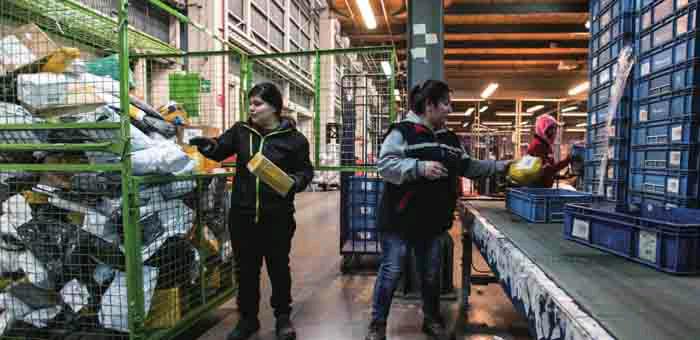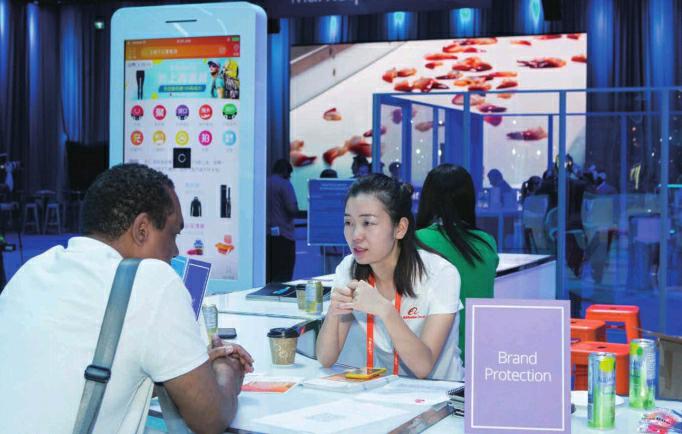New Retail Era
2017-11-27ByMichaelZakkour
By+Michael+Zakkour
On October 19, Alibaba Group officially launched its Global Shopping Festival with the announcement of three weeksworth of special events, sales, and activities that will culminate with the 24-hour consumption frenzy on November 11, dubbed “Singles Day.”
This years festival will be the biggest, in terms of gross merchandise value, the number of companies participating and the number of shoppers taking part, since the festivals e-commerce launch in 2009.
We will see a much bigger O2O (online to offl ine) offering and Alibaba is expected to fully demonstrate the power of its ecosystem to serve participating merchants by boosting the number of sales, the value of each sale, and the geographic and demographic reach of the festival to new customers.
Last year, I predicted that Alibaba would“go tech,” “go global” and “go glam” as a fi rst step to building the “New Retail,” making November 11 a global shopping holiday, and to harnessing the power of its ecosystem. All of these happened, while the festival produced $18 billion in gross merchandise value for the company.
This year Alibaba will make a statement to the world that they are now a global technology, retail, entertainment and supply chain company that is serious about building its own ecosystem and global trade model.
The bigger picture is how this Singles Day will be the coming out party for Chinese technologies, Chinese e-commerce and the New Retail model, the centerpiece of Jack Mas vision for transforming the entire retail experience, from how companies and individuals make and sell products to how, where and why consumers shop.
I have written for years about how global brands and retailers do not have to wonder about what their future holds, they only need to look to China. In many important ways China is years ahead of the rest of the world in the utilization of technology for every aspect of life, and shopping and consumption are the most conspicuous examples of this lead. This years festival will not only produce massive sales for merchants who participate, but will also provide a roadmap for their future in all markets.
The New Retail concept
From a global perspective, the stakes for the shopping season are even higher because New Retail is the launching point for Alibabas “Five New” strategy. In a letter to shareholders Ma explains: “E-commerce is rapidly evolving into‘New Retail. The boundary between offl ine and online commerce disappears as we focus on fulfilling the personalized needs of each cus-tomer. In China, our New Retail initiatives are taking shape as the starting point to our ‘Five New strategy, comprised of New Retail, New Finance, New Manufacturing, New Technology and New Energy.”endprint
Alibabas vision for the future is to build an ecosystem from the “Five New” strategy that empowers and makes it easy for individuals, small and medium-sized businesses, farmers and companies of all sizes to do business globally.
The implications for the future of Chinas economy, Chinese technologies and China as a leader in global free trade are enormous. This shopping festival will also be a powerful demonstration of how China is shaping the future of e-commerce, global consumption and supply chains.
As Ma points out “New Retail will bring about a restructuring of the global supply chain and change the complexion of globalization from the domain of big companies to small businesses.”
Alibaba is also focused on further developing Chinas rural areas through New Retail and making it a model that can be exported. Ma wrote: “If Alibaba can help rural villages and impoverished areas across China to improve their conditions through technology, then we will have a chance to make an impact in other places around the world. Technology does not have to be the culprit in widening the wealth gap around the world.”
Joining global competition
Having conquered Chinas e-commerce market, Alibaba is now ready to compete with the worlds biggest and best-known technology and retail companies.
A year after announcing its intention to reshape the consumer experience through its New Retail strategy, this years festival will build on the technology, globalization and early bricks-and-mortar integration introduced last year. The end goal is the digitization of global trade to provide producers and shoppers with a “Uni-channel” experience—the complete integration of making, selling and moving products and the erasure of the online versus offl ine distinction.
Last year Alibaba started integrating bricks-and-mortar stores into the Singles Day experience and demonstrated the power of its cloud computing arm, which processed 120,000 orders per second, its massive supply chain and the logistics capabilities of its Cainiao network, which shipped 637 million packages for 24 hours worth of orders.
A lot has changed in the last year on the global retail and e-commerce stage. There are a select few global titans now competing to serve a global audience at the confl uence of trade, consumption, technology, entertainment and supply chain.
The most important development of the year is the massive investments in bricks-and-mortar operations that Alibaba and Amazon are making in their respective markets (and the concurrent investment by titans like Walmart in e-commerce) to eliminate the distinction between online and offline and to create a Uni-channel experience. Alibaba understands it is no longer about whether online or offl ine will win out. Success will come through integrating the strengths of both to provide a customercentric and customized experience for everyone.
Alibaba and Amazon are the current leaders in the race to reshape the entire six mega-processes—plan, make, buy, store, distribute and sell—of the supply chain that are integral to business, life and trade in a“digital globalization” environment.
Further, Alibabas vision of global expansion dovetails nicely with Chinas Belt and Road Initiative. Chinas vision of using technology, supply chains, infrastructure and free trade to shape the future of the global economy is a fi t for Chinas technology and commercial titans.endprint
